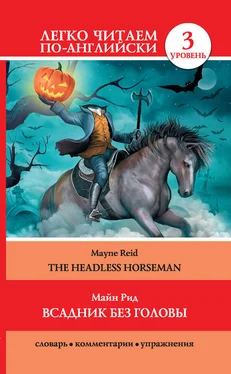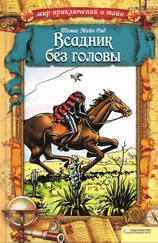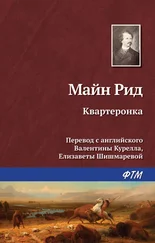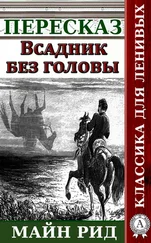The scrap of paper is the last link in the chain of evidence; and, though the motive is an inconceivable mystery, there is now scarce any one who has a doubt about the doer of the deed.
After a short time spent in examining the envelope the witness who has hinted at having something more to tell, is directed to continue his narration.
He proceeds to give an account of his suspicions – those that originally prompted him to seek for “sign” upon the prairie. He tells of the shot fired by Calhoun from the copse; and of the chase that succeeded. Last of all, he describes the scene in the chapparal, where the Headless Horseman has been caught – giving this latest episode in all its details, with his own interpretation of it.
The eyes of the auditory are no longer fixed upon him.
“Let the Irishman go – he is innocent! We don’t want any farther evidence. We’re convinced of it. Let him go free!”
Such is the talk that proceeds from the excited spectators.
“Let Cassius Calhoun be arrested, and put upon his trial! It’s he that’s done the deed! That’s why he’s shown so bitter against the other! If he’s innocent, he’ll be able to prove it. Come, judge; order Mr Calhoun to be brought before the Court.”
The judge dares not refuse compliance with a proposal so energetically urged: and, despite the informality, Cassius Calhoun is called upon to come before the Court.
The summons of the crier, thrice loudly pronounced, receives no response; and all eyes go in search of Calhoun.
The spectators catch sight of a man, moving among the horses that stand over the plain.
Proceeding stealthily, as if to avoid being observed, he moves at a rapid rate.
“It is he! It is Calhoun!” cries the voice of one who has recognised him.
“Trying to steal off!” proclaims another.
“Follow him!” shouts the judge. “Follow, and bring him back!”
Giving a wild glance backward, Calhoun heads his horse towards the prairie – going off at a gallop.
Scores of men rush simultaneously towards their horses.
Answer the following questions:
1) What did the footmarks that Zeb had found testify?
2) How many bullet holes were there in the corpse? Why?
3) What was inscribed on the bullet extracted from the body?
4) What was the last evidence against Cassius Calhoun? What effect did it produce?
The first use Maurice the mustanger makes of his liberty is to rush towards the horse late ridden by the headless rider – as all know – his own.
The animal recognises its master; proclaims it by giving utterance to a glad neigh.
In the next instant Maurice is on the back of the blood-bay, with the bridle in his grasp.
The spectators stand gazing after. There is no longer a doubt as to the result. The wish, almost universal, has become a universal belief. God has decided that the assassin shall not escape; but that he will be overtaken, captured, and brought back before the tribunal by the man, so near suffering death through his perjured testimony. [64]
A lady strains her eyes through the curtains of a carriage – her glance telling of a thought different that felt by the common spectators.
In her eye, still showing sadness, there is a gleam of triumph as it follows the pursuer – tempered with mercy, as it falls upon the pursued.
***
Just as he has begun to feel hopeful of escape, Calhoun, looking back, catches sight of the red stallion; no longer with that strange shape upon his back, but one as well recognised, and to him even more terrible. He perceives it to be Maurice, the mustanger – the man he was so near devoting – to the most disgraceful of deaths!
From any other pursuer there might have been a chance of escaping. There is none from Maurice Gerald!
His soul is absorbed with the horror of a dread death – not less dread, from his knowing that he deserves it.
He hears the hoofstroke of the red horse; and along with it the voice of the avenging rider, summoning him to stop!
He is too late to seek concealment in the thicket, and with a cry he reins up.
It is accompanied by a gesture; quick followed by a flash, a puff of white smoke, and a sharp detonation, that tell of the discharge of a revolver.
But the bullet whistles harmlessly through the air; while in the opposite direction is heard a whistling sound; and a long serpent seems to uncoil itself in the air!
Calhoun sees it through the thinning smoke.
He has no time to draw trigger for a second shot – no time even to avoid the lazo’s loop. Before he can do either, he feels it settling over his shoulders; he hears the dread summons, “Surrender, you assassin!” In the next instant, he experiences the sensation of one who has been kicked from a scaffold!
The assassin lies stretched along the earth – his arms embraced by the rope – to all appearance dead.
But his captor does not trust to this. He believes it to be only a faint.
“Great God, to think of the crime he has committed! Killed his own cousin, and then cut off his head!” mutters the mustanger to himself. “There can be no doubt that he has done both; though from what motive, God only can tell, – or himself, if he is still alive.
***
The Court has once more resumed its functions under the great evergreen oak.
Maurice Gerald is no longer the cynosure of those scowling eyes. In the place late occupied by him another stands. Cassius Calhoun is now the prisoner at the bar!
His guilt is no longer the question that is being considered. There is but one missing link – the motive.
Why should Cassius Calhoun have killed his own cousin? Why cut off his head?
In the usual solemn manner the condemned man is invited to make his final speech.
He looks wildly around. On the faces that encircle him he sees not one wearing an expression of sympathy.
He feels that there is no chance of escape; that he is standing by the side of his coffin.
“Have you anything to say why sentence of death should not be pronounced upon you?”
“No!” he replies, “I have not. The jury has given a just verdict. I acknowledge that I have forfeited my life, and deserve to lose it.”
The spectators are astonished beyond the power of speech; and in silence permit the condemned man to proceed, with what they now perceive to be his confession.
“It is quite true,” continues he, “that I killed Henry Poindexter – shot him dead in the chapparal.”
The declaration is answered by a cry from the crowd. It is altogether involuntary, and expresses horror rather than indignation.
Alike involuntary is the groan that goes with it – proceeding from a single individual, whom all know to be the father of the murdered man.
“After what I’ve confessed, it would be folly to expect pardon; and I don’t. I’ve been a bad fellow; and no doubt have done enough to deserve my fate. But, bad as I may have been, I’m not vile enough to be sent out of the world, and leave behind me the horrid imputation of having murdered my own cousin. I did take his life, as I’ve told you. You are all asking why, and conjecturing about the motive. There was none.
“You wonder at that. It’s easily explained. I killed him by mistake!”
“Yes, by mistake; and God knows I was sorry enough, on discovering that I had made it. I didn’t know myself till long after.”
“I don’t deny,” continues he; “I needn’t – that I intended to kill some one. I did. Nor am I going to deny who it was. It was the man I see standing before me.”
In a glance of concentrated hatred, the speaker rests his eye upon Gerald; who only answers with a look, so calm as almost to betray indifference.
Читать дальше
Конец ознакомительного отрывка
Купить книгу








